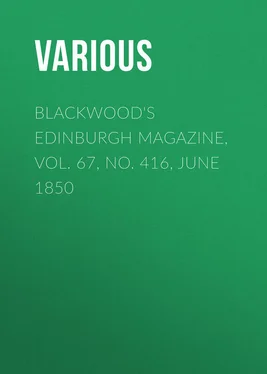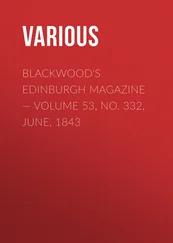Various - Blackwood's Edinburgh Magazine, Vol. 67, No. 416, June 1850
Здесь есть возможность читать онлайн «Various - Blackwood's Edinburgh Magazine, Vol. 67, No. 416, June 1850» — ознакомительный отрывок электронной книги совершенно бесплатно, а после прочтения отрывка купить полную версию. В некоторых случаях можно слушать аудио, скачать через торрент в формате fb2 и присутствует краткое содержание. Издательство: Иностранный паблик, Жанр: periodic, foreign_edu, Путешествия и география, на английском языке. Описание произведения, (предисловие) а так же отзывы посетителей доступны на портале библиотеки ЛибКат.
- Название:Blackwood's Edinburgh Magazine, Vol. 67, No. 416, June 1850
- Автор:
- Издательство:Иностранный паблик
- Жанр:
- Год:неизвестен
- ISBN:нет данных
- Рейтинг книги:5 / 5. Голосов: 1
-
Избранное:Добавить в избранное
- Отзывы:
-
Ваша оценка:
- 100
- 1
- 2
- 3
- 4
- 5
Blackwood's Edinburgh Magazine, Vol. 67, No. 416, June 1850: краткое содержание, описание и аннотация
Предлагаем к чтению аннотацию, описание, краткое содержание или предисловие (зависит от того, что написал сам автор книги «Blackwood's Edinburgh Magazine, Vol. 67, No. 416, June 1850»). Если вы не нашли необходимую информацию о книге — напишите в комментариях, мы постараемся отыскать её.
Blackwood's Edinburgh Magazine, Vol. 67, No. 416, June 1850 — читать онлайн ознакомительный отрывок
Ниже представлен текст книги, разбитый по страницам. Система сохранения места последней прочитанной страницы, позволяет с удобством читать онлайн бесплатно книгу «Blackwood's Edinburgh Magazine, Vol. 67, No. 416, June 1850», без необходимости каждый раз заново искать на чём Вы остановились. Поставьте закладку, и сможете в любой момент перейти на страницу, на которой закончили чтение.
Интервал:
Закладка:
Let us now suppose that Mr Carlyle has succeeded in his quest after capable men – that he has fairly bolted his Noblest, like an overgrown badger, from the hole in which he lies presently concealed, and has surrounded him with a staff of the Nobler, including, we presume, the author of the Latter-day Pamphlets. Noblest and Nobler must now go to work in serious earnest, taking some order with the flabby monsters, laughing hyænas, predatory wolves, and blue, or blue and yellow devils, which abound in this New Era. What is the first step to be adopted? We find it in No. I.
We have transcribed already the commencement of the speech to be made by the new British Minister to the assembled paupers – let us hear a few sentences —
"But as for you, my indigent incompetent friends, I have to repeat, with sorrow but with perfect clearness, what is plainly undeniable, and is even clamorous to get itself admitted, that you are of the nature of slaves , – or if you prefer the word of nomadic, and now even vagrant and vagabond servants that can find no master on those terms ; which seems to me a much uglier word. Emancipation? You have been emancipated with a vengeance! Foolish souls! I say the whole world cannot emancipate you. Fealty to ignorant unruliness, to gluttonous sluggish Improvidence, to the Beerpot and the Devil, who is there that can emancipate a man in that predicament? Not a whole Reform Bill, a whole French Revolution executed for his behoof alone."
In this style, Noblest proceeds for a page or two, haranguing the unlucky paupers upon the principle that poverty is crime; taunting them with previous doles of Indian meal and money, and informing them that the Workhouses are thenceforward inexorably shut. Finally, he announces that they are to be embodied into industrial regiments, with proper officers; and marched off "to the Irish Bogs, to the vacant desolations of Connaught now falling into Cannibalism, to mis-tilled Connaught, to ditto Munster, Leinster, Ulster, I will lead you; to the English fox covers, furze-grown Commons, New Forests, Salisbury Plains; likewise to the Scotch Hillsides, and bare rushy slopes which as yet feed only sheep." All these are to be tilled by the slave regiments under the following penalties for recusancy. "Refuse to strike into it; shirk the heavy labour, disobey the rules – I will admonish and endeavour to incite you; if in vain, I will flog you; if still in vain, I will at last shoot you, – and make God's Earth, and the forlorn-hope in God's Battle, free of you. Understand it, I advise you!" O rare Thomas Carlyle!
The language in which this significant and notable plan is conveyed, is more original than the plan itself. Other Liberals than Mr Carlyle have propounded the doctrine that the pauper is a slave of the state. A century and a half ago, Fletcher of Saltoun wrote a treatise to that effect, and probably a more determined republican than Fletcher never stepped in upper leathers. But somehow or other, although Scotland was then less scrupulous in matters of personal freedom than the sister kingdom, the scheme was by no means received with acclamation. Heritable jurisdictions were all very well in their way, but the idea of reducing the peasantry to the state of Russian serfdom, was rather more than the free parliament of the Scots Estates could contrive to stomach. It has been very shrewdly remarked that there is a wide circle in politics, whereof the connecting link lies between ultra-liberalism and absolute tyranny. Mr Carlyle, without meaning it, gives us a fair exemplification of this in the present pamphlets. Messrs Cobden and Bright afford us an unmistakeable exemplification of it, in their endeavours to frustrate the operation of the Ten Hours' Bill. M. Ledru Rollin demonstrated it in his circulars, on the occasion of the first French republican election. Liberty is a beautiful term, but its true signification is unknown to the thorough-paced demagogue.
According to the spirit of the British laws, labour can only be enforced as the penalty of crime. Mr Carlyle would change this, and would place the pauper upon precisely the same level as the convict. We are not prepared to say that some important improvements might not be made in the practical operation of the poor-laws. We have read various pamphlets, published in this city and elsewhere, which strenuously recommend the employment of the able-bodied poor in the reclaiming of waste lands, and their immediate removal from the towns. There is, however, much more philanthropy than philosophy in these schemes. In order to discover a proper remedy, we ought in every case to direct our primary attention to the nature and origin of the disease; and this is precisely what our modern philanthropists neglect to do. People do not crowd into towns of their own choice. Give them their free will, and the means of subsistence, and one and all of them will prefer the fresh air, and the sights and sounds of nature, to the stifling atmosphere, the reeking filth, and the discordant cries of the city lanes and courts. But no such free will exists: the balance has not been kept between the country and the towns. No encouragement has been given to the small manufactures, which in former times were the support of villages now rapidly falling into decay. The gigantic power of machinery, set in motion by large capital, has nearly abolished the hand-loom. Worsted knitting, yarn-spinning, straw-plaiting, are now rendered almost profitless occupations. In order to live, the villagers have been forced to migrate to the towns. We need hardly refer to the earliest of the Free-trade measures, which, by substituting Spanish barilla for kelp, threw whole districts of the West Highlands at once into a state of pauperism. At this moment, a new cause is aggravating the evil. The stagnation of agricultural employment occasioned by the abolition of the corn duties, has given a new impetus to rural emigration; and those who cannot afford their passage to foreign parts naturally seek refuge in the towns. In another year – if the experiment should be continued so long – the effects of this last change will become more evident than they are now. The able-bodied ploughman is the last of the agricultural class who will suffer. Those who have already been compelled to change their homes, or to go upon the parish-list, are the cottars, who derived their subsistence from the employment given them by resident proprietors. So long as encouragement to agricultural improvement existed, these poor people never wanted work; but now the calamitous fall in the price of produce, and the prospect of a great diminution of rents, have compelled the landlords to discontinue their improvements, and to reduce the expenses of their establishments to the lowest possible limit. In this way, country labour is lessened, and town labour, by the increasing competition of hands, is cheapened. This is the true secret of all those startling revelations as to the misery, want, and positive oppression of the working classes which have lately appeared in the public journals, and which have engendered in the minds of many a natural despair as to the destiny of a state in which such things are suffered to exist. The remedy undoubtedly is neither an easy nor a speedy one; still, it is by no means to be included in the category of impossibilities. Machinery, which is the first great cause of British pauperism, cannot indeed be checked, but it may very easily be taxed . "An acre of land," says a late eminent writer, "if cultivated, must pay a tithe of its productions to support the religion of the state, and an equal contribution with any other property in respect of the poor, county, and church rates; but mechanical power may exercise its productive faculty ad infinitum , with but a trifling reference or liability to either the one or the other. The building may be rated at £200, £500, or £1000 a-year, but it has a power within it which, as compared with landed property rated at the same amount, will produce a hundredfold as great a return – a principle in legislation as deteriorating in its operation on the masses as it is unjust to individuals." That machinery, which has changed the whole character of our population, and which, in fact, has been the means of creating this stern reality of pauperism, is not taxed upon the principle of its productive power. That it should be so, seems evident upon the smallest reflection. Land is not taxed on the principle of acreage, but on that of value, which again depends entirely on production. Why should not the manufactory be rated in the same manner? It is true that, by such a measure as this, pauperism could not be removed, but it would be materially checked, for the fair proportion of the burden would thus be thrown on the shoulders of those who occasioned it. But nothing effectual can be done until the nation has finally determined what policy it is to pursue for the future, and in all time coming, with respect to native industry. If Free Trade is to go on, pauperism must continue like a Upas tree to spread and overshadow the land. It is not within the range of possibility that this can be otherwise. No church-extension, education, cheap literature, ventilation, sewerage, public baths, or model lodging-houses, can avail to mitigate the evil. It is town competition – made triply worse by the operation of low tariffs – which is driving the working classes to the verge of the pit of despair; and that town competition is increasing, and will increase, so long as a fresh daily supply of hands is driven from country labour. The scheme of the philanthropists to whom we have referred, is to take the surplusage from the towns and to send them to the country. This, in the present state of matters, is about as feasible an undertaking as if we were to try to make a stream of water run up-hill. Why, the misery and indigence which they seek to relieve, is not the result of mere idleness, dissipation, or profligacy – it arises from over-competition in one department of industry, occasioned by the utter want of profitable employment in another. There would be no need of industrial regiments to cultivate the soil, if its cultivation were allowed to be remunerative. But to set our pauper population at work upon anything which will not repay private enterprise is mere delusion. We have said this much upon a topic of the greatest interest, and the utmost importance, because we are convinced that many persons, who are fully impressed with the magnitude of the evil, have mistaken the remedy from the want of a due consideration of the causes from whence that evil has arisen. It is, however, a subject too large for incidental discussion, and we shall probably return to it on a future occasion, when we can state our views without reference to the whimsical vagaries of Mr Carlyle.
Читать дальшеИнтервал:
Закладка:
Похожие книги на «Blackwood's Edinburgh Magazine, Vol. 67, No. 416, June 1850»
Представляем Вашему вниманию похожие книги на «Blackwood's Edinburgh Magazine, Vol. 67, No. 416, June 1850» списком для выбора. Мы отобрали схожую по названию и смыслу литературу в надежде предоставить читателям больше вариантов отыскать новые, интересные, ещё непрочитанные произведения.
Обсуждение, отзывы о книге «Blackwood's Edinburgh Magazine, Vol. 67, No. 416, June 1850» и просто собственные мнения читателей. Оставьте ваши комментарии, напишите, что Вы думаете о произведении, его смысле или главных героях. Укажите что конкретно понравилось, а что нет, и почему Вы так считаете.












